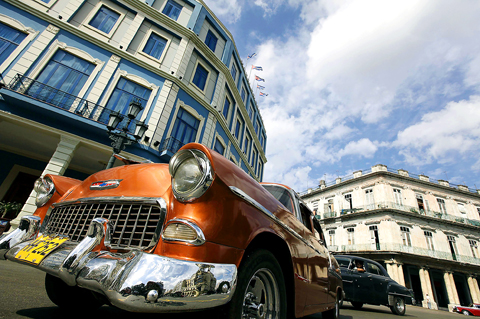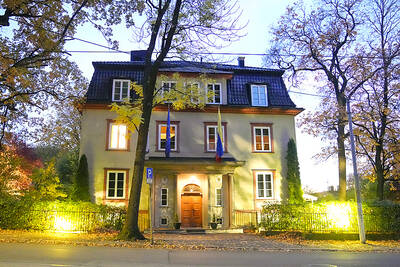Yoan used to earn US$25 a month working as a computer technician for a state company — and an extra US$500 selling Internet access on Cuba’s vast and varied black market.
The 31-year-old managed 10 accounts for government employees who had authorized e-mail access and would rent out their passwords to trusted clients under certain rules: they could only connect at night or in the early hours, and had to avoid political references.
“I did it because I couldn’t live off my salary,” Yoan said.

PHOTO: REUTERS
But the technician had taken a large risk amid a crackdown by the government of Cuban President Raul Castro as part of an offensive on illegal businesses.
“There was an audit a little while ago, they trawled through the telephone numbers and one customer gave the game away,” Yoan said. “They sacked me and I paid a 1,500 peso [US$60] fine.”
Yoan, who also received a ban from working for four years, was a tiny link in the chain connecting Cubans to the illegal network. An e-mail service costs US$10 to US$15 per month, it costs US$50 per month to navigate the Internet, and US$1 to send or receive an e-mail.
“I need to be in contact with my friends and the world, but I can’t afford ‘underground’ Internet so I only have e-mail. I connect at night because that’s what my illegal provider tells me to do,” said Aida, a 38-year-old former waitress.
Cuba connects to the Internet by satellite because the decades-long US embargo prevents access to underwater cables that pass near its coastlines.
The government blames the embargo for its limits on the service — it gives priority to state and foreign companies, academics, doctors and research centers.
Dissidents and critics of the government say Cuba, like China, limits Internet access to restrict freedom of information and control criticism of the regime.
They say that is why authorities block dissident sites or blogs, such as the award-winning blog of Yoani Sanchez, for being subversive.
Cubans can connect to e-mail at controlled state access points for US$1.5 per hour or access the Internet in hotels with cards costing US$7 per hour.
But with the average monthly salary at US$20, that is out of reach of most citizens.
“I can’t pay that — that’s why I have illegal e-mail to communicate with my father in Miami,” said Marilis, a 23-year-old law student.
“I’ve never written anything political,” she added indignantly.
Raul Castro allowed computer sales two years ago, but Internet access remains limited.
Barely 1.4 million of the 11.2 million inhabitants have Internet access, and only 630,000 have computers, according to official figures.
Shared access is blamed for slow and patchy connections.
Deputy Computing Minister Ramon Linares said recently that the island’s connection speeds had increased, and an underwater cable was due to start operating from Venezuela in 2011.
That still won’t be enough for Aida.
“Even if they solve the technical problems, we won’t have free access,” she said. “It’s clear that those who lead the country decide what we can consult.”

STEPPING UP: Diminished US polar science presence mean opportunities for the UK and other countries, although China or Russia might also fill that gap, a researcher said The UK’s flagship polar research vessel is to head to Antarctica next week to help advance dozens of climate change-linked science projects, as Western nations spearhead studies there while the US withdraws. The RRS Sir David Attenborough, a state-of-the-art ship named after the renowned British naturalist, would aid research on everything from “hunting underwater tsunamis” to tracking glacier melt and whale populations. Operated by the British Antarctic Survey (BAS), the country’s polar research institute, the 15,000-tonne icebreaker — boasting a helipad, and various laboratories and gadgetry — is pivotal to the UK’s efforts to assess climate change’s impact there. “The saying goes

Police in China detained dozens of pastors of one of its largest underground churches over the weekend, a church spokesperson and relatives said, in the biggest crackdown on Christians since 2018. The detentions, which come amid renewed China-US tensions after Beijing dramatically expanded rare earth export controls last week, drew condemnation from US Secretary of State Marco Rubio, who on Sunday called for the immediate release of the pastors. Pastor Jin Mingri (金明日), founder of Zion Church, an unofficial “house church” not sanctioned by the Chinese government, was detained at his home in the southern city of Beihai on Friday evening, said

Floods on Sunday trapped people in vehicles and homes in Spain as torrential rain drenched the northeastern Catalonia region, a day after downpours unleashed travel chaos on the Mediterranean island of Ibiza. Local media shared videos of roaring torrents of brown water tearing through streets and submerging vehicles. National weather agency AEMET decreed the highest red alert in the province of Tarragona, warning of 180mm of rain in 12 hours in the Ebro River delta. Catalan fire service spokesman Oriol Corbella told reporters people had been caught by surprise, with people trapped “inside vehicles, in buildings, on ground floors.” Santa Barbara Mayor Josep Lluis

The Venezuelan government on Monday said that it would close its embassies in Norway and Australia, and open new ones in Burkina Faso and Zimbabwe in a restructuring of its foreign service, after weeks of growing tensions with the US. The closures are part of the “strategic reassignation of resources,” Venezueland President Nicolas Maduro’s government said in a statement, adding that consular services to Venezuelans in Norway and Australia would be provided by diplomatic missions, with details to be shared in the coming days. The Norwegian Ministry of Foreign Affairs said that it had received notice of the embassy closure, but no